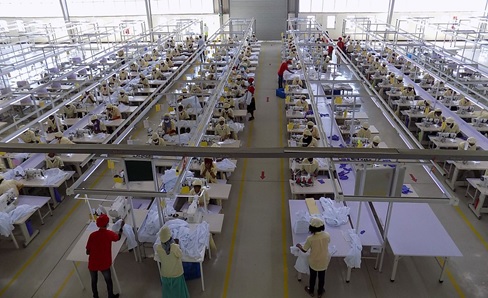
BY ABEBE WOLDEGIORGIS
Ethiopia is the inhabitant of more than 115 million people with abundant untapped natural resources including vast arable land, conducive climate, surface and underground water and sufficient rain and mine but due to less utilization of technology, shortage of finance the role of the natural resource in supporting the economic growth is very low.
Recently, the Ethiopian Chamber of Commerce and Sectorial Association provided training to journalists in Adama town on economic issues. One of the paper presenters was Zerihun Birhane (PhD) who is working as instructor in the department of economics at Addis Ababa University.
As to him, in the last two decades the government strived to achieve economic growth in the sectors such as agriculture, manufacturing and services and some tangible results are registered. He further said that, most investments put on the development endeavor came from the public sector and the role of the private sector in this regard is insignificant. The government spent huge amount of money on the construction of infrastructure which played an instrumental role for the registered economic growth.
Roads, rail ways, industry parks and hydropower dams, etc can be mentioned in this regard. The construction sector which engaged in the construction of infrastructure created job opportunities for hundreds of thousands and also created market opportunity to cement industries, quarry, and the transport sector to move inputs and outputs to customers. The expansion of industry parks enabled to attract foreign and local investment and created jobs for thousands.
It also created market linkage to the agriculture and most agro industries could utilize inputs from local sources. The manufacturing sector also played vital role in boosting export and substituting imports. It also paved the way to the private sector to play its own part. To support the agricultural sector government imported agricultural inputs such as fertilizer, pesticides and herbicides and supplied to farmers with subsidized price. Not only these, it supplied selected seeds obtained both from local and foreign sources. In addition, it encouraged private sector to involve in agriculture by providing land and tax holidays while they import agricultural machinery.
As to Zerihun, 72 percent of the nation’s labor goes to the agricultural sector and most farmers plow farmlands with small size which is bellow a hectare and such a situation also has its draw back on rising productivity and boost production. He also said farming activities mostly utilize human and animal labor. In the pre and post-harvest seasons about 30 percent crops is wasted. The absence of sufficient warehouses also makes the products vulnerable to insects and snow which in turn reduces the amount.
He further said that the sector is subsistence and vulnerable to the extreme weather conditions and due to the current global warming and climate change the sector is critically affected. Hence, to withstand the challenge applying climate smart agriculture must be taken as option including the expansion of irrigation farm by exploiting surface and underground water, using drought resistance selected seeds and providing extension service to farmers.
The sub sector of agriculture which is the livestock sector has huge potential. It is the largest in Africa in number. But due to traditional practice of cattle rearing system, the contribution of the sector to the economy can be said limited. In fact it contributes 20 percent to the agricultural GDP. It has a potential for meat and milk production but so far, the nation fundamentally exports live animals, hide, skin and limited amount of slaughtered cattle as compared to its potential.
The leather and leather products sector utilizes local skin and hides in large proportion. Currently, the sector created job opportunity to thousands and plays pivotal role in supplying its products to local and foreign markets.
As to him, though some progress is observed, the unemployed rate is increasing. Consequently, organizing and creating job to the unemployed helps boosting the economy. To this end, paying attention to the small scale enterprises is essential. Providing loan along with suitable working areas and linking them to the market is essential.
As to Zerihun, there are numerous challenges that need to be redressed. Among others, sustaining the witnessed economic growth, reduction of poverty, ensuring good governance, creating more job opportunities both by the government and the private sector, reducing inequality between citizen’s income and dependency on aid also must be reduced.
He further said that, other key challenges that must be addressed are conflict that had been taking place in the northern part of Ethiopia which incurred heavy toll on the economy, the prevalence of COVID 19, global warming and climate change that critically affect the sectors such as agriculture, health, water and transportation etc.
The rising of price on food items and the price hike of fertilizer is because of skyrocketed fuel price resulted from the war between Russia and Ukraine. Moreover, the reduction of income in urban centers affects the efforts for ensuring food security. As to Zerihun, if the global warming continued as it is by 2021 Africa’s food production will be decreased by 90 percent.
According to him, the contribution of the agricultural sector to the Gross Domestic Production though it is reduced, it is not big as such. And this indicates that the economic growth did not bring structural change. He further said that the service sector is growing rapidly and its contribution to the GDP is surpassed the manufacturing sector and this indicates that the unhealthy feature of the economy. Had the manufacturing sector’s contribution to the GDP been surpassed the service sector, it would have been better because the employing capacity of the service sector is very small.
In the last budget year, Ethiopia earned 1.2 billion Dollars from agriculture. In the country, 15 million people earn its living from the coffee business. On the other hand, the Ethiopian airlines which employed 17 thousand workers earned about 4 billion Dollars by exporting its services. Hence, though the service sector garnered huge amount of hard currency as compared to the agriculture sector which comprises coffee production, it employed very few people. Therefore, to change the imbalance, more attention should be given for the agriculture and to that of the manufacturing to boost their export earnings.
As to Zerihun, currently the government debt rose to 57 percent of the nation’s GDP. It borrowed money from local and foreign sources and such situation aggravates inflation which hurts the poor segment of the society. Hence, the government should reduce its dependency on money borrowing to meet its development aspiration and better to look other options.
Zerihun further said that currently, the citizens’ productivity capacity is 38 percent which is bellow even the average of sub Saharan African Countries which is 50 percent. He also said that 90 percent of labor force employee deployed its physical capacity rather than its mental capacity. And the figure indicates that how Ethiopia lags behind other developed and developing countries and this shows that the level of using technology for performing job is insignificant. About 37 percent of children in Ethiopia are malnourished and this again directly related with the rampant poverty prevailed in the country.
Malnourishment also has impact on citizen’s productive capacity; because it reduces mental and physical potential of children in their later age. According to the recent UNESCO due to malnutrition Ethiopia annually lose about 30 billion Birr which could support the GDP.
Ethiopia also currently has been price taker of the international market. When imported commodities price is soared due to the war between Russia and Ukraine it will be a victim. The inflated price of fuel and fertilizer can be mentioned the case in point. No cargo ships dare to go to the war zone. As a result, those interested cargo ships go to the war zone to transport the goods imported from Ukraine and Russia by taking the risk as the result, the freight price will be increased and the imported commodities price also soared.
As to Zerihun, currently, fuel, steel and iron and fertilizers are in short supply. As the result, the construction sector is crippled and many construction companies lay off their workers which in turn affects them and their family life.
Hence, to reverse the situation, the government should work rigorously by taking bold measures. Particularly on addressing shortage of hard currency, creating job opportunity, building resilient infrastructure, utilizing social capital, diversifying the export, exporting local products by value addition and implementing the home grown economic reform effectively.
The Ethiopian Herald November 11/2022


